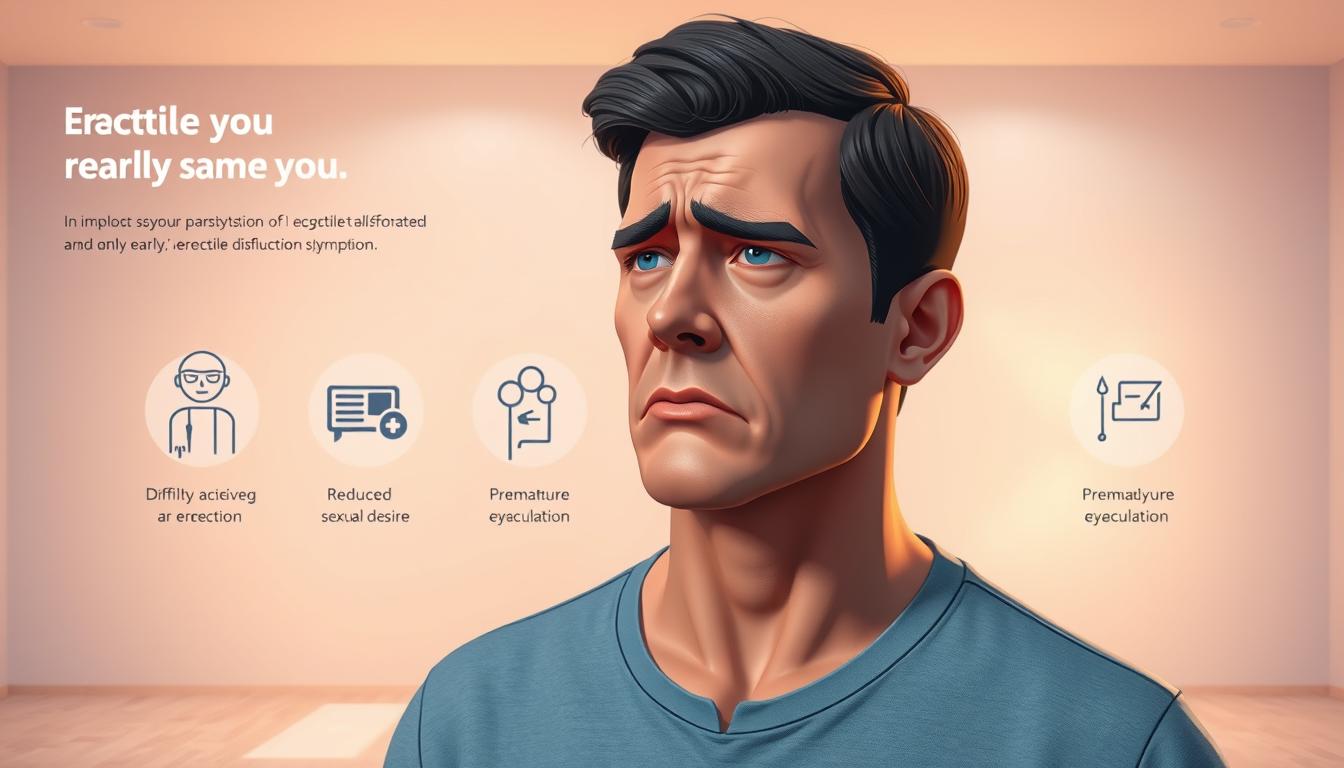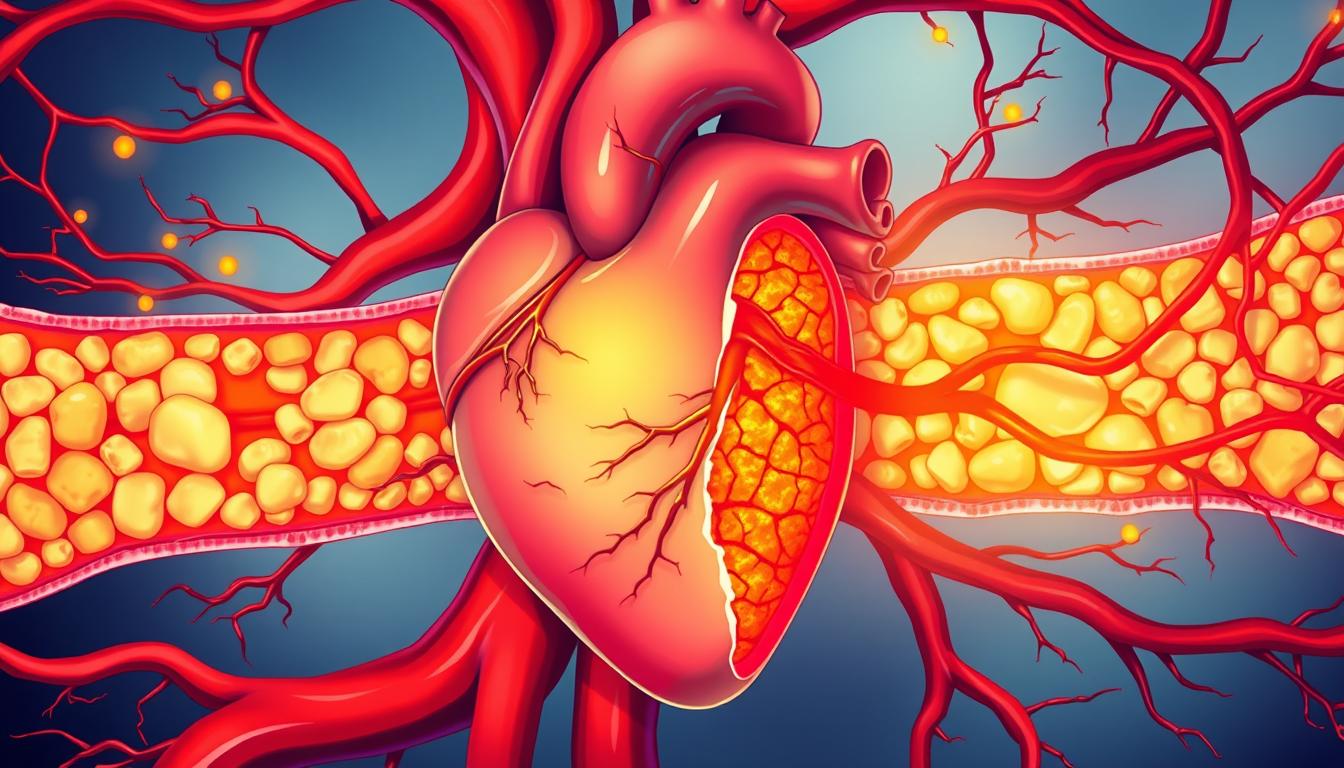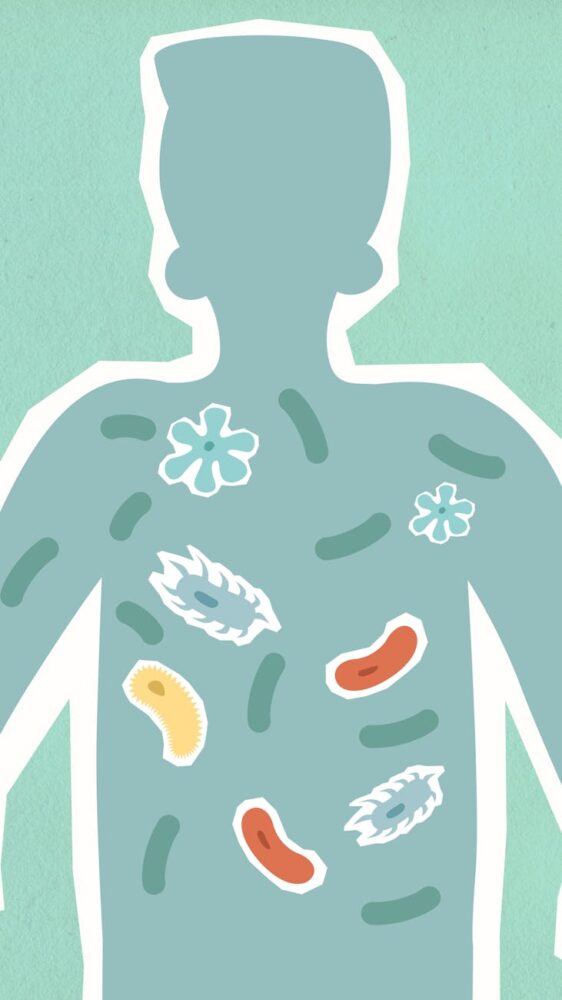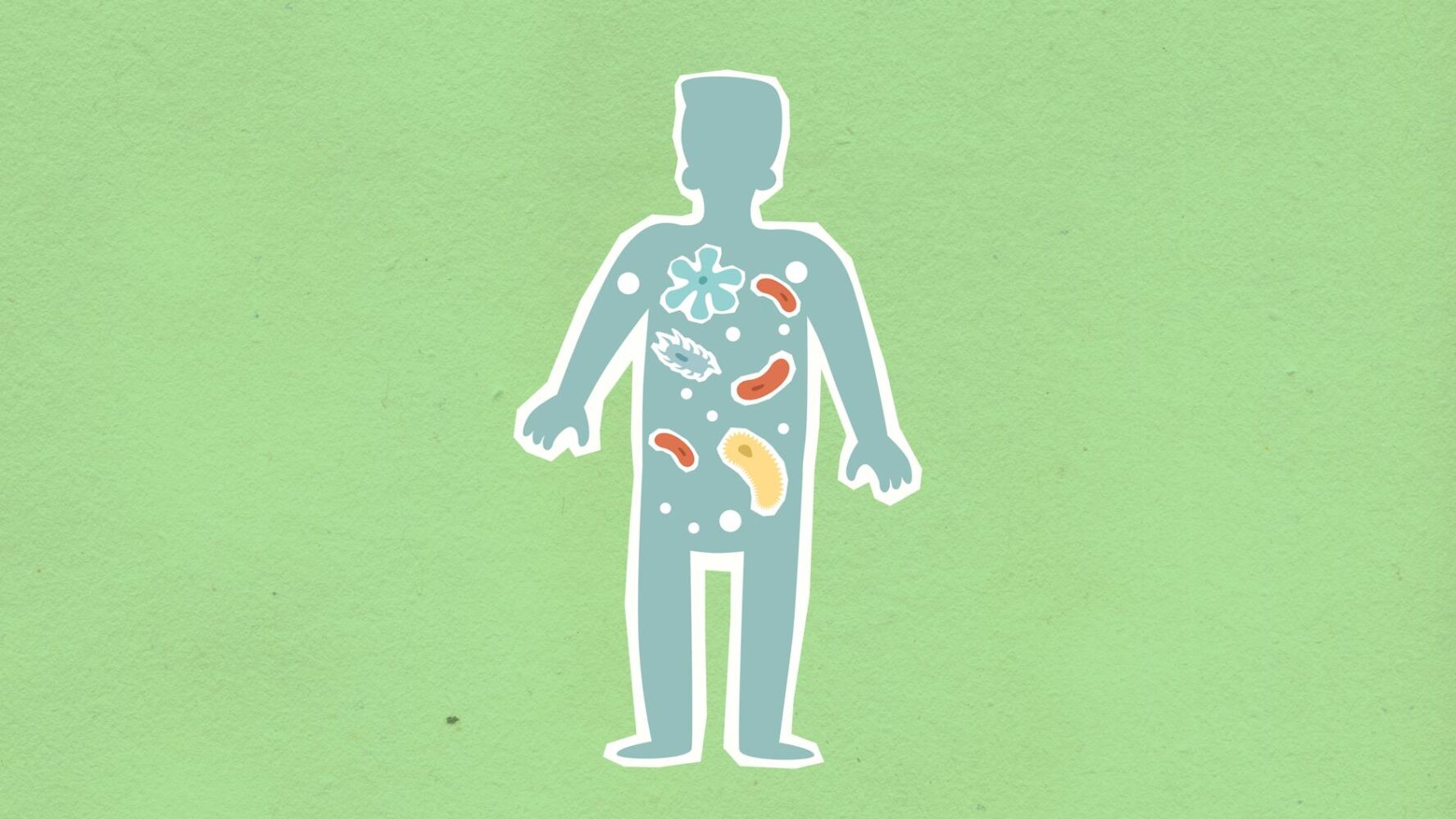Imagine being at a romantic dinner. The ambiance is perfect, with laughter and soft music. You lean in to whisper sweet nothings, hoping for a spark.
But as the night goes on, you feel something’s off. You hesitate, wondering if you’re experiencing erectile dysfunction symptoms. Spotting these signs early is key for your sexual health and overall life quality.
Understanding impotence indicators lets you seek solutions early. This fosters open talks with your partner and doctor.
By catching signs early, you can find ways to regain intimacy and confidence. Let’s dive into what erectile dysfunction is and why knowing its symptoms matters.
Key Takeaways
- Early detection of erectile dysfunction symptoms can enhance treatment outcomes.
- Understanding impotence indicators helps in proactive sexual health management.
- Discussing ED signs is important for both personal and relationship wellness.
- Recognizing changes in sexual health can promote timely medical consultations.
- Awareness of ED symptoms can reduce stigma and encourage open conversations.
Understanding Erectile Dysfunction
Erectile dysfunction (ED) is a big problem for many men. It means they can’t get or keep an erection for sex. This can make them feel bad and worried.
Knowing the erectile dysfunction symptoms is key. It’s not just for old men. Young guys can have erectile issues too, because of mind or body problems.
What is Erectile Dysfunction?
Erectile dysfunction is not just for old guys. It’s a real health issue. If you have trouble getting or keeping an erection, it’s time to get help.
Common Misconceptions About ED
There are many wrong ideas about erectile dysfunction. Some think it’s only in the mind, ignoring health problems like diabetes. Others believe only old men have it, not realizing young guys can too.
This thinking stops people from talking about their erectile issues. This means they miss out on getting the help they need.
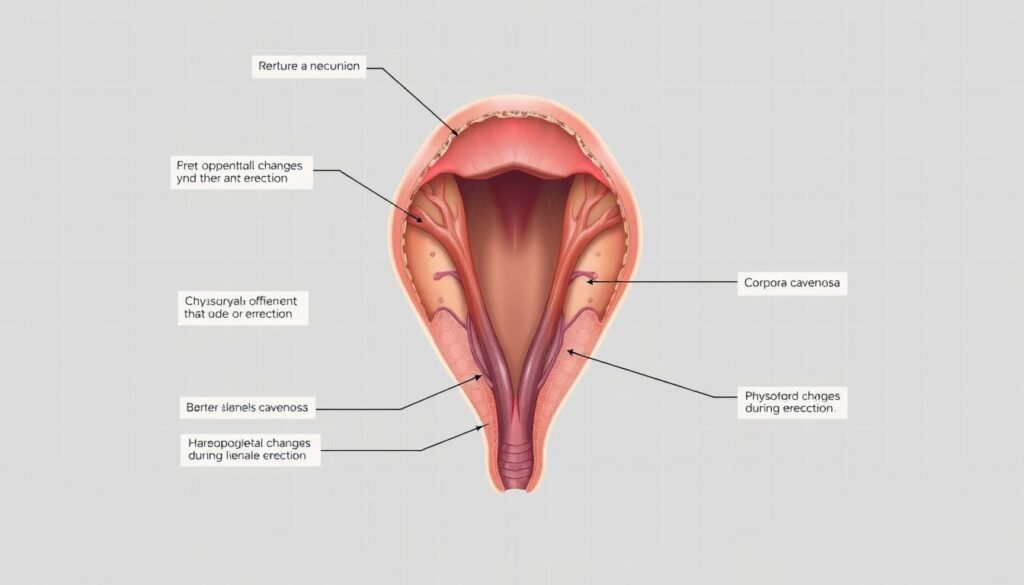
| Myth | Fact |
|---|---|
| ED is only a psychological issue. | ED can have both physical and psychological causes. |
| Only older men experience ED. | Men of all ages can experience erectile dysfunction. |
| ED is not treatable. | Many effective treatment options are available for ED. |
Erectile Dysfunction Symptoms
Knowing the early signs of erectile dysfunction is key. Spotting these signs early helps you get help and find treatments. Symptoms can affect your body and mind in many ways.
Identifying the Early Signs
Early signs of erectile dysfunction include:
- Difficulty achieving an erection
- Challenges in maintaining an erection
- Decreased sexual desire or arousal
These erectile dysfunction warning signs can start small. You might notice them when you’re intimate or stressed. Spotting these signs early is crucial in managing the issue.
How Symptoms May Vary Over Time
As time goes on, signs of ED can change. You might face occasional issues that become more common. Stress, health, and mood can also affect symptoms. Keeping track of these changes helps in finding the right treatment.

| Symptom | Early Stage | Progressive Stage |
|---|---|---|
| Difficulty Achieving Erection | Occasional | Frequent |
| Difficulty Maintaining Erection | Intermittent | Consistent |
| Low Sexual Desire | Mild | Significant |
Common Signs of ED
It’s important to know the signs of impotence early. This helps in getting the right treatment. Many signs can show you have erectile dysfunction.
Difficulty Achieving an Erection
Many people have trouble getting an erection. This can be due to health issues or mental problems. If it keeps happening, you might need to see a doctor.
Difficulty Maintaining an Erection
It’s also hard to keep an erection during sex. You might get an erection but then lose it. This can make sex less fun and cause stress.
Low Sexual Desire and Arousal
Feeling less interested in sex is a big sign. It could be because of hormones or stress. Noticing this change is key, as it often means other problems too.
Causes of Erectile Dysfunction
Erectile dysfunction can come from many reasons. Knowing these erectile dysfunction causes helps fix the problem. There are physical causes of ED and psychological factors to consider.
Physical Causes of ED
Many men face erectile dysfunction because of health problems. Here’s a list of common physical causes:
| Physical Causes | Description |
|---|---|
| Cardiovascular Disease | Heart problems can stop blood flow, making it hard to get an erection. |
| Diabetes | High blood sugar can harm nerves and blood vessels, causing ED. |
| Hormonal Imbalances | Low testosterone or other hormonal problems can affect sex. |
| Neurological Disorders | Diseases like Parkinson’s or multiple sclerosis can mess with nerve signals for erections. |
Psychological Factors
Psychological issues also play a big part in erectile dysfunction. Stress, anxiety, and depression can make sex harder. Here are some key psychological factors:
- Stress: Daily worries can take away from sex.
- Anxiety: Fear of not doing well can cause anxiety during sex.
- Depression: It can lower sex drive and interest.
Impotence Indicators: When to Seek Help
If you’re having trouble with sex, you might have ED. Noticing these signs early helps a lot. It keeps your feelings and relationships safe.
Recognizing the Right Time
Struggling with erections often means it’s time to see a doctor. Men often ignore these signs. But, getting help early is key to feeling better.
Understanding the Impact on Relationships
ED can hurt your relationship with your partner. It might make you feel bad or upset. Research shows it can make things tough between you and your partner.
Talking about ED can help you and your partner. It makes your relationship stronger.
Diagnosing Erectile Dysfunction
Diagnosing erectile dysfunction involves certain steps and tests. Knowing about these can help ease your worries. Getting a clear diagnosis can lead to better treatment and understanding of your condition.
Steps to Diagnosis
First, you’ll talk to a healthcare professional. They will ask about your symptoms and health history. This is the start of figuring out what’s going on.
- Comprehensive medical history: Your doctor will ask about your symptoms, sexual history, and any underlying health conditions.
- Physical examination: A physical exam helps identify any physical causes of erectile dysfunction, including hormonal issues or blood flow problems.
- Laboratory tests: Blood work may be necessary to check your hormone levels, cholesterol, and blood sugar, which can shed light on underlying health concerns.
Common Erectile Dysfunction Tests
After the initial steps, more tests might be needed. These tests help understand your condition better. They include:
- Peyronie’s disease evaluation: This test assesses any curvature of the penis that may affect erections.
- Nocturnal penile tumescence test: This involves monitoring erections that occur during sleep to determine if the issue is physical or psychological.
- Ultrasound: Used to detect issues with blood flow to the penis.
These tests help you understand your erectile dysfunction better. Your healthcare provider can then guide you to the right treatment.
Managing Erectile Dysfunction Symptoms
Dealing with erectile dysfunction needs a few steps. Making lifestyle changes and trying different treatments can help a lot. Getting advice from a doctor is key to moving forward.
Lifestyle Changes and Their Impact
Changing your lifestyle can really help with erectile dysfunction. Eating well, with lots of fruits, veggies, and lean meats, boosts blood flow. Exercise, like walking or swimming, keeps your heart healthy and helps with weight.
- Quit smoking to improve vascular health.
- Limit alcohol intake to reduce its effects on sexual performance.
- Manage stress through mindfulness or yoga practices.
Treatment Options Available
If lifestyle changes don’t work, there are other ways to help. Medicines like sildenafil (Viagra) and tadalafil (Cialis) help blood flow. Therapy can tackle any mental issues. Devices like vacuum erection devices are options too. There are also natural supplements that do the job very well, like Nitric Oxide Boosters
The Importance of Professional Consultation
Seeing a doctor is very important for erectile dysfunction. They can figure out what’s causing it and suggest the best treatment. Doctors provide a safe space to talk about your concerns.
Conclusion
It’s important to spot erectile dysfunction signs early. This helps you manage and treat it better. By noticing these signs, you can work on your sexual health and feel better overall.
Knowing what to look for can help you get the help you need. It’s okay to have problems in the bedroom. Talking about them can make your relationships better.
Think about what you’ve learned here. If you see any of these signs in yourself, talk to a doctor. This could really improve your life, bring back intimacy, and give you peace of mind.
